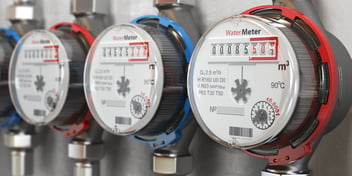Should you invest in digital metering infrastructure?
Deciding to invest in digital metering infrastructure isn’t an easy one, considering the extensive debate regarding the cost-effectiveness of the technology. Now, researchers are developing a new model to help decision-makers weigh up the pros and cons.
Presenting at Ozwater’20 Online, Griffith University’s Ian Monks said the research aimed to identify, value and catalogue the benefits of employing digital metering to help water utilities broaden the scope of options considered.
“The objectives of the study were to quite simply find every benefit of digital metering that we could, tangible and intangible, and to develop a framework for identifying and valuing them,” he said.
Former Managing Operator at City West Water in Melbourne, Monks said leaks can cause a lot of adverse consequences, for both utilities and customers, and that digital metering may be able to relieve the impact of network issues due to the availability of data.
“[There’s] a lot of wasted water, unnecessary infrastructure and operating expenses to deliver the extra water. A leak might also include an angry customer, extra phone calls and maybe a billing dispute,” he said.
“There’ll be possible restricted flow to the property or even legal action for non-payment, or an escalation of the dispute to the Ombudsman. There might be a plumbing assistance expense, and the set up of a monthly payment plan.
“For the customer, there will be an elevated plumbing expense because the problem was not detected earlier. The customer will also be dealing with the inconvenience of restricted flow or maybe an insurance claim, with more phone calls and payment of an excess.”
Monks said more information about the context-based benefits of digital metering was clearly needed to help inform utility managers.
“Our search for benefits of digital water metering was extensive. As well as the academic and industry literature, we looked at annual reports, news and social media and vendor case studies, and we interviewed a number of people in the industry,” he said.
“Our survey of experts asked about the likelihood that the benefits could be achieved, and to quantify that benefit. We identified 75 possible benefits that had been previously unrevealed. All in all, 41 benefits were agreed upon by all the experts we surveyed.”
Quantifying the benefits
Monks said there were two significant findings from the study, both of which shed light on how utilities should approach their adoption of the innovative technology.
“[Firstly], increasing the range of benefits in the analysis and applying modeling based on expert opinions can strengthen the business case by applying a risk-based outcome,” Monk said.
“Secondly, the modelling only covers the benefits that have a dollar value to the water utility. Benefits to customers can shift their level of satisfaction. We think that’s worthy of further investigation.”
Monks said all the possibilities of digital metering were still not understood and that the water sector needed more education on these.
“The level of disagreement [among experts] between benefits indicates a need for more communication and discussion within water utilities, and with researchers and vendors,” he said.
“Benefits to customers are less understood than benefits to business. We think there is a need for more customer-focused staff to be involved in the potential digital metering data to improve processes.”
Some of the novel benefits discovered during the research include: more viable monthly billing arrangements, improved cash flow, eliminating the administration of payment plans, smoothing out the customer’s utility payments, and allowing customers to choose their billing date.
“Meter analytics is enhanced when more data is available to trend performance. Good meters can be left in service while failing meters can be detected and withdrawn. There is less write-off of high bills, and government assistance programs can be directed to the most needy,” Monks said.
Furthermore, Monks said the investment in and utilisation of digital metering helps to progress a utility overall, as changes are made to incorporate the data into decision-making. This helps make water utilities more operationally sophisticated across the board.
“Enabling these benefits leads us to consider just how mature a water utility might be,” he said.
“Moving towards digital metering advances a utility, but the big steps forward require data and leverage through in-house resources, external leverages or through off-the-shelf software systems.”
The study has helped to locate new areas of research, Monks said, but learning to apply digital metering cost-effectively will ultimately be up to each individual utility.
“This study has opened up new frontiers for research in water business efficiency and customer involvement in water service delivery,” he said.
“Advocates of digital water metering within industry, as well as vendors, might consider running multi-disciplinary workshops and disseminating research, case studies and post-project reviews to advance consensus and understanding.”
To learn more about Ozwater’20 Online and to register, click here.



